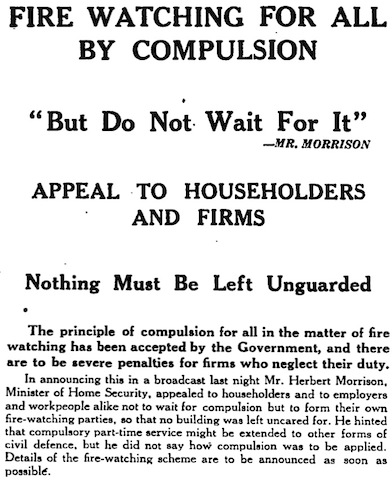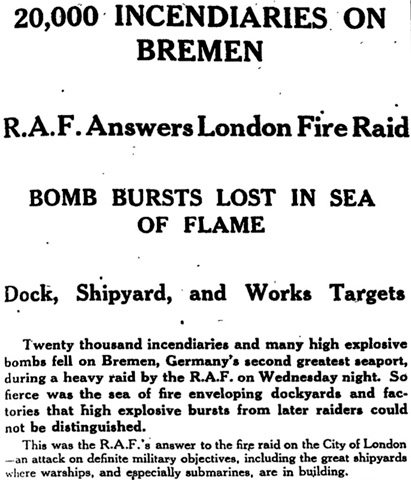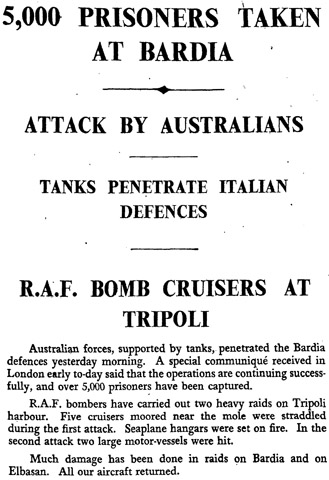
The Mediterranean theatre of war has seen a lot of action in recent days, as these headlines from The Times (4) show. While the Italian outpost at Bardia is besieged from land, sea and air, British armoured units are approaching Tobruk, 70 miles to the west. On Monday night, Italian warships at Taranto were bombed by the RAF: ’11 bombs were seen to burst around the target’ (though without such striking success as attended the Royal Navy’s raid last November). The Greek army is continuing its slow and stubborn advance, though ‘the present line of Italian defence shows no clear sign of cracking’.
Yesterday, Blenheims of Bomber Command made snap daylight raids on targets in Germany and the Netherlands, making direct hits on a bridge, a factory, an aerodrome and a flak ship. J. R. B., writing to the editor of the Manchester Guardian from Manchester, would presumably approve of bombing industrial targets in Germany; but would also presumably want ‘homes’ bombed too, due to ‘the obvious demoralising effect that it must have on the workers’ (8).
Has it not occurred to the advocates of “no reprisals” that it is not really a question of retaliation, but merely one of prosecution of the war? If the civilian can be so blithely informed that he is in the firing line, does it not make sense that enemy civilians should at least occupy the position that is expected of him?
The writer understands that some people sincerely ‘think this form of defence wrong, but they, like the war fiends […] can be almost equally menacing to a community. They fail to grasp the realities of the situation’. As if to prove J. R. B.’s point, The Times publishes some interesting statistics about the damage done by bombers to sleep and work irrespective of any bombs dropped (4):
London spent approximately 1,180 hours — equal to 49 whole days — under alerts during 1940. The sirens sounded over 400 times during the year.
Another, grimmer statistic for 1940 is that road fatalities were up 26 per cent on 1939’s figures (8347 to 6628), due in large part to the blackout. The Chief Constable of Oldham can’t see things improving any time soon (Manchester Guardian, 8):
With the development of intensified air attacks on this country any further modification of the lighting restrictions does not appear likely, and unless greater care is shown by all road-users there is a distinct possibility that the accident figures throughout the country are likely to show a steady and melancholy rise.
Still, modern cities have a tremendous ability to route around damage (The Times, 2):
The life of the City has adapted itself in great measure to this desolate tragedy. Instructions to staffs have been posted on office doors that open on to nothing but the charred remains of what last week were well-furnished premises. In Basinghall Street a tea shop opposite one of the side entrances to Guildhall was being used yesterday as an office from which permits had to be obtained by people wishing to visit on business buildings which were unsafe. During most of the morning and afternoon there was a long queue outside this office.
You can’t stop bureaucracy.
You also can’t stop British civil aviation. Despite ‘Hitler’s boast of having established an aerial blockade of Britain […] civil aircraft have flown 5,000,000 miles to and from Britain, carrying nearly 30,000,000 air-mail letters alone’ (Manchester Guardian, 7). Transatlantic flights even ‘at the height of the invasion crisis’ are credited with ‘enormous propaganda value’.
I’m not sure if Dr. Joseph Needham, a Cambridge biochemist and embryologist, flew across the Atlantic during for his five-month tour of American universities; the report of the Guardian‘s scientific correspondent on their interview (4) doesn’t say. But it does contain much interesting information about the attitude of American scientists to Nazi Germany, and in particular ‘the Nazi Philosophies of Science’. Actually, they didn’t know much about ‘such conceptions as “Wehrwissenschaft,” or the conscious direction of science to destructive purposes’ at all until they attended one of Needham’s lectures:
Dr. Needham found that, as in England, extremely few people had read any of the Nazi literature on science. The writings of Stark and Lenard on physics; of Spann, Klages, and Blüher on philosophy; of Marr, Jung, Haiser, and Möller-Brück on sociology; of Brohmer on biology; of Jeansch, Hommes, Krannhals, and Schulze-Sölde on racialism; of Stapel and Freyer on ethics; and the speculative mythology of Rosenberg and Krieck were virtually unknown. Hommes, for instance, writes that “the concept that twice two make four is somehow differently tinged in the minds of a German, a Frenchman, a Negro, or a Jew.”
I suspect G. A. Sutherland of Victoria Park knows where Needham is coming from, even if his target is British broadcasting rather than German scholarship (8):
By its action in protecting the public from the pernicious singing of the Orpheus Choir under the direction of the pacifist Sir Hugh Roberton the B.B.C. has earned the plaudits of all prudent patriots. It therefore came as a great shock to read in the “Radio Times” that a lifelong pacifist, Sir Arthur Eddington, was actually being allowed to disseminate his insidious astronomical theories in a talk with the significant title “Other Worlds.” Should not the person responsible for subjecting the nation to so grave a risk be immediately removed from office?
Well played, sir, well played.
![]() This work is licensed under a Creative Commons Attribution-NonCommercial-NoDerivatives 4.0 International License.
Permissions beyond the scope of this license may be available at http://airminded.org/copyright/.
This work is licensed under a Creative Commons Attribution-NonCommercial-NoDerivatives 4.0 International License.
Permissions beyond the scope of this license may be available at http://airminded.org/copyright/.



